Most folks don’t give it a thought when they head to the store for a gallon of milk, go outside to take a walk or pick up the phone to call a friend. But for someone diagnosed with post-traumatic stress disorder, even these seemingly innocuous behaviors may seem daunting.
“After a traumatic event, many people have stress-related reactions, such as fear, sadness, guilt, bad memories and sleep problems,” says Kristen Barlow, PTSD clinical team psychologist at the Charles George VA Medical Center in Asheville. But when debilitating symptoms such as flashbacks, nightmares, anxiety, irritability, anger and hypervigilance “don’t go away over time and significantly disrupt a person’s life, they may have PTSD.” These core symptoms, she continues, “impact their ability to enjoy life and may hurt their relationships with others, or cause problems for them at work or school.”
Across the country, growing numbers of veterans are being diagnosed with the condition. Between 1999 and 2010, the number of veterans receiving service-connected compensation for PTSD increased 222 percent, notes psychologist Laura Tugman, assistant chief of mental health services at the local VA hospital. Roughly two-thirds of the people her department is currently treating — 5,554 veterans, all told — have been diagnosed with PTSD, says Tugman. That doesn’t include those receiving disability compensation who don’t seek help from the hospital’s mental health services.
Part of the problem, she notes, is that younger veterans have spent more time in combat. “Many Operation Enduring Freedom and Operation Iraqi Freedom veterans have been in combat deployments longer than veterans of any other combat era.”
Increased outreach by government agencies may also play a role. “The Department of Defense and the Department of Veterans Affairs have implemented very strong programs to increase awareness about the symptoms of PTSD, provide screenings for combat veterans and decrease the stigma surrounding PTSD,” says Tugman. As a result, “More veterans are seeking treatment.”
The form that treatment takes may vary considerably, however, depending on individual preferences and needs.
The VA focuses on “evidence-based, trauma-focused psychotherapies such as cognitive processing and prolonged exposure as the first-line treatment options for patients with PTSD,” she says. But those approaches go only so far, and many local veterans are turning to alternatives provided by various nonprofit groups to find the help they need to heal.
Evidence-based therapies
The current treatment recommendations for PTSD are based on an extensive review of the literature, notes Tugman. “The decision to adopt an evidence-based treatment and invest in training VA mental health providers in it is made at the national level.”
Cognitive processing therapy helps people target the distressing memories and thoughts and learn skills for handling them, says Barlow. This helps them understand what they went through and how it changed the way they see the world, themselves and others. The process is typically completed in 12 group or individual sessions.
Prolonged exposure therapy starts by educating patients about PTSD and teaching them how to use breathing techniques to relax and manage stress. Then, through a combination of real-world practice and talking through the experience, veterans gradually learn that they don’t have to avoid the thoughts, feelings and situations that remind them of the trauma, says Barlow. This usually takes anywhere from eight to 15 individual sessions.
“The VA also recognizes acceptance and commitment therapy for veterans suffering from PTSD as a result of military sexual trauma,” notes Tugman.
“We don’t engage in a one-size-fits-all model. We want to provide as many options as possible,” including supplemental programs such as WRAP, Veteran X/Veteran Hope and Life Abilities groups. Drawing on all of these approaches, she explains, “A treatment plan is constructed with the individual veteran’s preferences, strengths and needs strongly considered.”
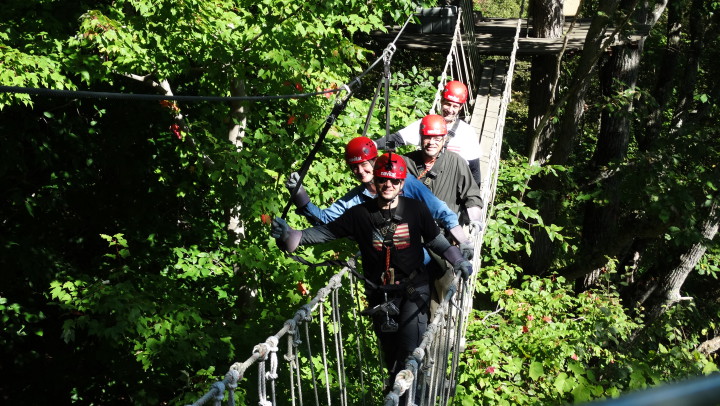
The VA also provides information concerning what other options are available in the community.
Going through the motions
After serving as a U.S. Army medic in Iraq from 2004-05, Asheville resident Brandon Sirois found himself in an unexpected place — alone.
“When I came home, I went through the motions for a little while,” says Sirois. “I enrolled in college, got a part-time job and did all the stuff I was supposed to be doing.”
Soon, however, loneliness, depression and a sense of being misplaced began taking over his life. “That led me to being a hermit: I didn’t want to do anything with anyone,” he recalls.
Diagnosed with adjustment disorder in 2005 and PTSD in 2008, “It’s been a long struggle for me to manage the symptoms that I was now going to live with and find my way in this new life,” he explains. “I would just spiral down and down and down and not know how to get myself out of it.”
Traditional therapy gave Sirois a handle on some of his symptoms, but for years, he still felt there was something missing.
A weeklong Outward Bound trip for veterans in 2014 led to a life-changing realization. “I had formed closer bonds with people in those couple of days than I had, really, with people throughout my time being back home,” Sirois reveals. “It was talking with someone that knows what you’re talking about and knows how you’re feeling, because they’ve been through the same thing.”
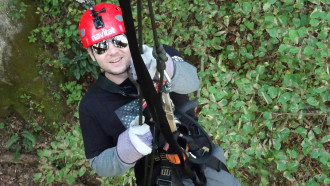
That prompted Sirois to help found Inspiring Our Heroes, a nonprofit that uses shared adventure- and nature-based experiences to create support systems for veterans.
“I really wanted to combine outdoor recreation and fellowship with other vets to create this healing environment,” he explains. “Smaller, local chapters facilitate people making new friends in their area and having a new support system.”
A partnership with Navitat Canopy Adventures in Barnardsville provided free zip line tours to Inspiring Our Heroes participants. Sirois now works with the Veterans Healing Farm in Hendersonville, but the partnership with Navitat continues. There are also plans to offer kayaking and canoeing through the Asheville Outdoor Center.
“There are a lot of organizations around that are trying to help vets,” notes Sirois. “This just gives another option, because everyone is unique and heals in different ways. Having a large array available can help everyone customize their healing.”
Still, it isn’t easy. “I don’t want this to come off like a success story about how I overcame PTSD, because the truth is that I still struggle with it, and there are a lot of vets out there who, like me, struggle daily,” he reveals. “I want to give them the inspiration to keep moving forward and not let it keep them down.”
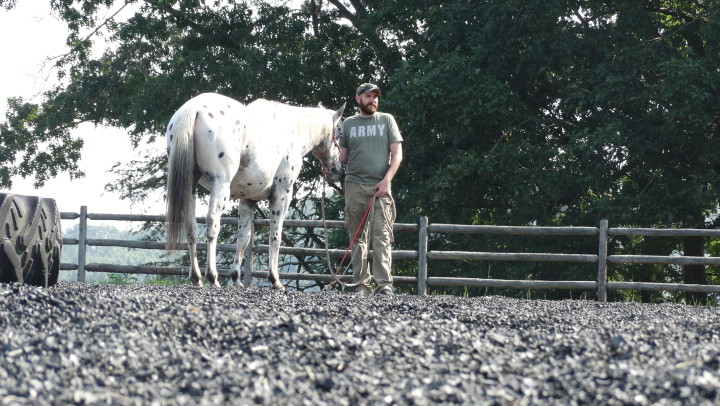
Horse sense
Asheville resident Matthew Estridge was diagnosed with PTSD after his first Army deployment and began receiving treatment while still in the service. During a second deployment in 2007, however, he was hit by an improvised explosive device that caused a traumatic brain injury and made his PTSD worse.
Awarded a Purple Heart and honorably discharged in 2008, Estridge has continued to receive treatment at the local VA hospital. Last month, however, he found his way to a nonprofit called Heart of Horse Sense.
“Even though the VA has been helpful with group sessions and counseling,” says Estridge, “finding a treatment like Heart of Horse Sense was something I was missing for a long time.”
Based in Marshall, the organization provides free equine-assisted psychotherapy as well as instruction in therapeutic riding and natural horsemanship (a technique for training horses).
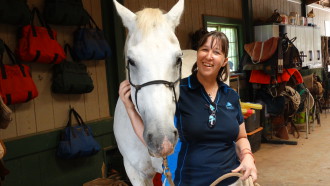
“Veterans and at-risk youth are the two groups we see that can benefit the most from these services,” says Executive Director Shannon Knapp. “They’re also two groups that may not choose traditional talk therapy. ‘Tell me how that makes you feel’ is generally not something they’re going to participate in.”
Working with horses, says Estridge, “teaches me to be confident in myself, because that’s what they require from me: They teach me patience and make me feel at peace, like they understand what’s going on inside me.”
Estridge had no prior experience with horses, but he says the program “is special to me: It’s helped me out more than I thought it could. And it gets me out of the house, so I’m not sitting around depressed.”
Horses mimic human emotions, requiring calm communications that promote emotional awareness, self-control and impulse modulation, says Knapp, who founded the organization. “Through understanding and helping, the horse becomes less reactive, more of a partner; there’s something about that process that helps us become less reactive, more of a partner, and helps heal a traumatized brain.”
This dynamic connection with another living being makes equine-assisted therapy fundamentally different from some other approaches, she maintains. “Unlike other programs that have whitewater rafting or high-ropes courses, most of the time, a horse has an opinion about what you’re doing. You have a living, breathing animal who responds to you as you are; the river doesn’t care how you’re feeling today.”
Veterans can also choose to get involved with her organization, notes Knapp. “Sometimes they don’t want services but would rather help; it’s in their DNA.”
Jake LaRue has been volunteering with the nonprofit for a couple of years. The 44-year-old Marine Corps veteran, who’s been diagnosed with PTSD and bipolar disorder, says his involvement with the group has taught him “self-regulation, how to relate to people and how to develop relationships.”
But while Knapp firmly believes in the power of equine-assisted psychotherapy, “There need to be better studies to prove efficacy,” she asserts. However, “Getting good, hard numbers on such a soft subject can be really difficult.” But in a pilot study at Fort Carson, Colo., notes Knapp, a therapeutic horsemanship program reduced the risk of violence by veterans by 24 percent and suicide attempts by 62 percent.
Meanwhile, her organization is studying heart rate variability (measuring the length of the inhale and exhale) in people who participate in its programs. “When they’re equal,” Knapp explains, “that’s considered a coherent heart rate, which is ideal. If I have a superlong inhale and a supershort exhale, I’m jacking up my system; if I have a superlong exhale and a supershort inhale, I’m depressing my system.”
Veterans don’t need a referral to receive services from Heart of Horse Sense. “They can call us out of the blue, they can email us, or they can show up on an open day, such as Fall Fridays, which are walk-on days for vets from 9:30 a.m. to noon,” she explains, adding, “We really believe in horses’ incredible ability to do for [veterans] what humans cannot.”
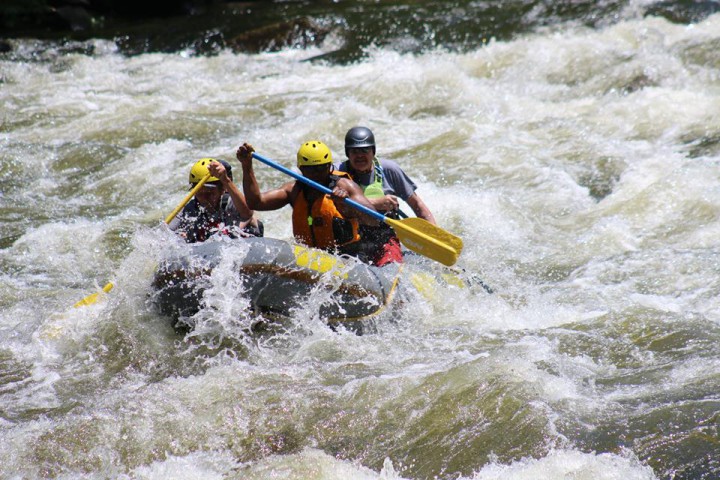
Not forgotten
Team River Runner brings veterans together through paddling programs designed to help participants embrace new challenges and develop leadership skills.
On any given Saturday during 10 months of the year, veterans can be found ripping whitewater in kayaks and rafts or practicing their skills in the Warren Wilson College pool. Their families are also welcome — a boon to people struggling with feelings of isolation.
“Programs like these let vets know they’re not forgotten,” says Cliff Counsell, the group’s volunteer coordinator. “I was a child of Vietnam, and when the vets came home, they were treated horribly. This is a way of acknowledging that they’ve done something important for the country.”
In addition, says Beverly Bradigan, lead recreation therapist at the Asheville VA facility, “It gets them out of the hospital, offers camaraderie, teaches new skills and gives them an adventure-based experience.” And because “we are always a sober paddling group,” it supports recovery from substance abuse. Veterans receiving treatment at the VA must get confirmation from their medical provider that they’re capable of taking part in Team River Runner’s program.
Melanie Jones has been part of the paddling group since April. “It’s such a wonderful gathering of people with similar backgrounds,” says the 48-year-old Asheville resident. “And it gets me out of the house, so I’m not sitting in the living room with the curtains closed.” Her son and daughters regularly join her on river trips.
No paddling experience is required, says Bradigan. “Participants have to be able to tolerate, at a minimum, sitting in a raft for several hours and getting wet,” she explains. “We always try to include everybody, from adapting equipment to adapting paddling style.”
Overcoming the stigma
Many other alternative approaches are also used to treat PTSD, including acupuncture, meditation, craniosacral therapy, eye movement desensitization and reprocessing (EMDR) and even fly-fishing. But whichever therapies a given individual chooses, a key goal is overcoming the stigma veterans often feel in connection with a PTSD diagnosis — in part because news reports tend to focus on what Sirois calls “worst-case scenarios.”
“A lot of times when you hear stuff in the media about PTSD, it has something to do with a bad, violent event,” he points out. “I know that is news, and people want to hear what’s going on and are truly concerned, but that sort of perpetuates the stigma.”
At the same time, he continues, “Yes, I have PTSD, but I’m not a bad person. I’m a really nice, great person, and I try to help people as much as I can. But when you look at the list of PTSD symptoms, it makes me look like a monster.”
Every veteran, says Sirois, “at some point in their life did a really selfless, courageous, amazing thing. They wanted to give up their life to protect other people, and I want every single one of them to be able to have a happy life, because that’s what they want other people to have.”
Knapp concurs. “Vets dealing with trauma issues aren’t broken,” she observes. “They’re incredibly strong and smart, but they do need something — whether that is horses or acupuncture or traditional therapy.”
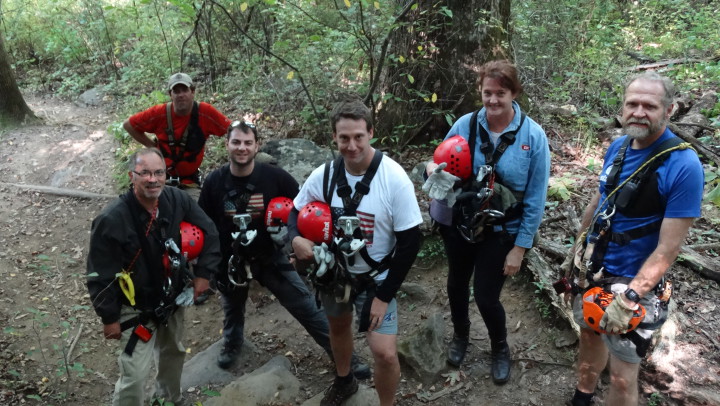
Fun and fundraising
Visit these websites for more information about the featured nonprofits and upcoming fundraisers:
Inspiring Our Heroes
Navitat Canopy Adventures
navitat.com/asheville-nc
On Veterans Day (Wednesday, Nov. 11), Navitat Canopy Adventures is inviting veterans to zip for free, with special discounted rates for their family members and the general public. For more information, contact Brandon Sirois (brandon.sirois@gmail.com).
Heart of Horse Sense
A fundraiser on Monday, Nov. 9, at the WNC Agricultural Center will include a demonstration of the group’s work, a silent auction, food and a screening of the award-winning documentary Riding My Way Back.
Team River Runner
teamriverrunner.org/get-involved/chapters/north-carolina-asheville
Veterans Healing Farm
http://veteranshealingfarm.org
SHOOTING WHITEWATER: Cliff Counsell, volunteer coordinator for Team River Runner, guides a group of veterans on the upper Pigeon River in Tennessee. Photo courtesy of Rip Roaring Adventures, Hartford, Tenn.
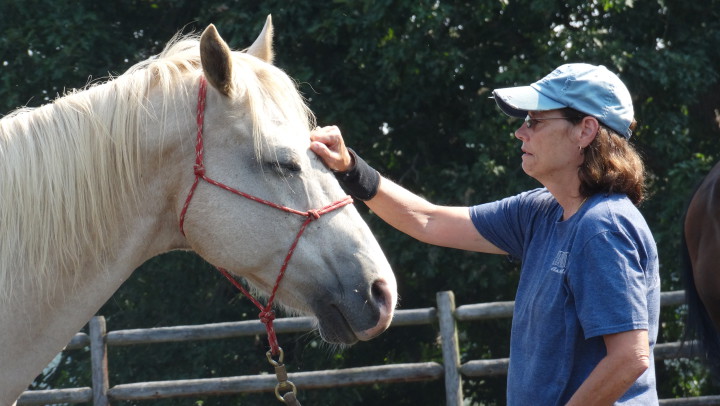


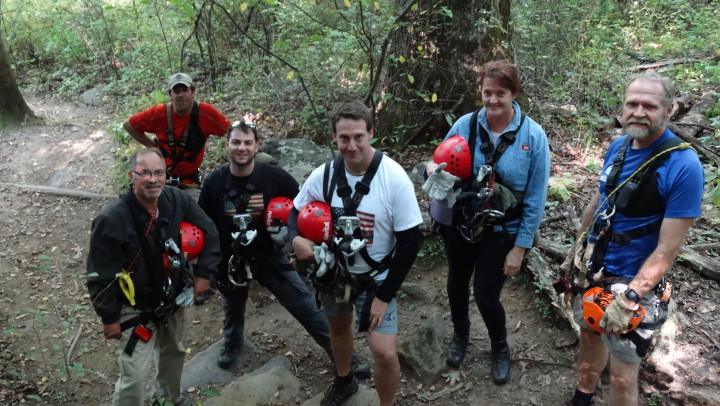
I’m a veteran who suffers/has suffered for years with PTSD. PTSD can be extremely hard to diagnose as one feels anxious, depressed, suicidal, etc. etc. PTSD is a collaboration of many feelings. I highly recommend reading ‘The Body Keeps The Score’ by Bessel Van Der Kolk M.D. It’s an incredible read that details the neuro-anatomical/physiological reactions to stress after a trauma. It outlines how and why we react to stress and why we feel they way they feel. It helps us understand and helps us explain to others whom we hurt when we lash out or detach from (even though loved ones). It reassures us that we are not crazy, but have developed significant issues as a result of a change in our brain function after trauma took place. It takes much courage and humility for us to accept that we suffer from PTSD, because we all feel as though we’ve become weakened and failed ourselves, our service to our communities, society, and family.
“Behaviors to avoid or escape from danger have clearly evolved to render each organism competitive in terms of survival. But inappropriately prolonged escape or avoidance behavior would put the animal at a disadvantage in that successful species preservation demands reproduction which, in turn, depends upon feeding, shelter and mating activities all of which are reciprocals of avoidance and escape.” -Charles Darwin
Great article. Thanks for focusing on our veterans. I’d like to add that North Carolina Outward Bound School offers free wilderness adventure programs to veterans who served during OIF/OND and those that have served during or are currently serving in OEF.
Mr Sirois describes the experience veterans have on Outward Bound programs precisely! I’m glad he attended a course at one of our sister schools.
Outward Bound Veterans programs are available throughout the United States. Tuition, fees and travel expenses are covered by generous donations to the program by individuals, foundations and corporations.
Programs are offered throughout the year in North Carolina, Florida, Maine, Colorado, California, Minnesota, Washington and Oregon. Veterans interested in attending an Outward Bound course should check out http://www.outwardbound.org/veteran-adventures/outward-bound-for-veterans/. As is the case with Team River Runner each applicant must have medical approval to attend.
For more information about veterans programs offered by North Carolina Outward Bound School check out http://www.ncobs.org/veterans.
Thanks to all the organizations that are working so hard for veterans here in Western North Carolina!
Matt Rosky
North Carolina Outward Bound Veterans Program Director
mrosky@ncobs.org
This is a great project. Looks like you have a good participation.
I take Cardio Vascular Exercise 5 day a week at the CRMC, Shelby, NC. I’ve been in the program about 6-1/2 yrs. I just love it and I’m 77 yrs.
Keep up the good work.
It would be greatly beneficial to many of us vets to get the Veterans Choice Program straightened out with the medical facilities around this area. It has been a nightmare for this vet, so I have to rely on my Medicare insurance.
It would be beneficial to many of us vets if the Veterans Choice program was better understood by local medical facilities. So this vet has to rely on Medicare to take care of my treatment bills.
That’s correct. My apologies.
As a Veteran of the Vietnam era and someone who has been homeless and has been diagnosed by the VA with PTSD I am glad to see that many are getting support and help through various programs but many are not because they are homeless and unemployed, Just look at the Vet suicide rates and stats on alochol and drug addiction. A non Vet could read this story and think that all is well and all vets are getting the support the need which is not true . I would like to suggest that this reporter visit the Mission shelter, ABCCM Vets Restoration Quarters, Beloved House, Ahope and the Asheville Homeless Nerwork to talk to more Vets about how they are doing. Also ,this was a positive story and I am happy for the Vets in it and also that you did it but I would like to see you do more.